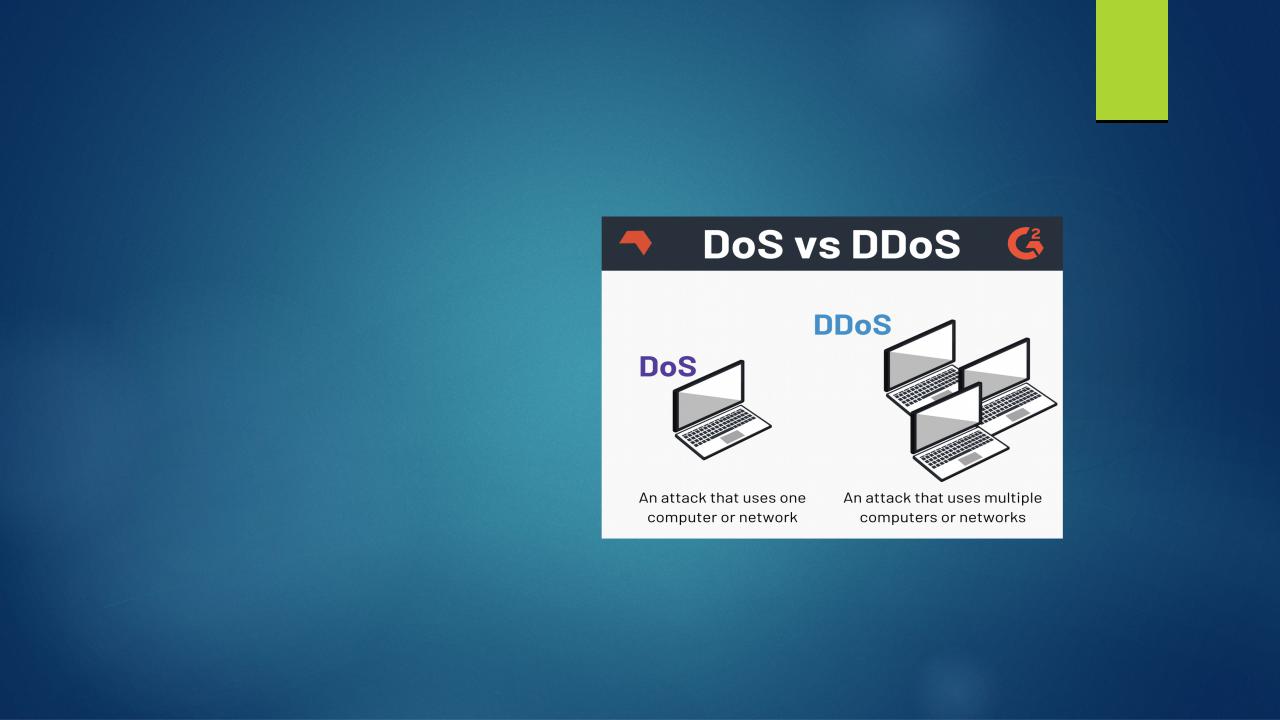
- •Department of foreign and Russian languages
- •What is DDoS?
- •The difference between Dos and DDoS
- •The main purpose
- •History
- •Reasons for DDoS attacks
- •Reasons for DDoS attacks
- •Reasons for DDoS attacks
- •Reasons for DDoS attacks
- •Reasons for DDoS attacks
- •Way of protection
- •Way of protection
- •Thanks for your attention

Department of foreign and Russian languages
Discipline: Foreign language
Distributed Denial of
Service (DDoS)
Performed:
Saint-Petersburg 2020

What is DDoS?
Distributed Denial of Service - an attack on an information system to prevent it from processing user requests. In simple words, DDoS consists of suppressing a web resource or server with traffic from a huge number of sources, which makes it inaccessible. Often such an attack is carried out to provoke interruptions in the operation of network resources in a large firm or government organization.

The difference between Dos and DDoS
A DDoS attack is similar to another common web threat- Denial of Service (DoS). The only difference is that a normal distributed attack comes from a single point, while a DDos attack is larger and comes from different sources.

The main purpose
The main purpose of a DDoS attack is to make a web site inaccessible to users by blocking its operation. But there are cases when such attacks are made in order to distract attention from other harmful effects. A DDoS attack can, for example, be carried out when a security system is compromised in order to take over an organization's database.

History
DDoS attacks came to public attention in 1999, when a series of attacks occurred on the websites of large companies (Yahoo, eBay, Amazon, CNN). Since then, this type of cyber crime has developed into a global threat. According to experts, in recent years, their frequency has increased by 2.5 times, and the maximum power has exceeded 1 Tbit / sec. Every sixth Russian company has been a victim of a DDoS attack at least once.

Reasons for DDoS attacks
Personal dislike.
It often encourages attackers to attack corporations or government companies. For example, in 1999, the FBI's web sites were attacked, causing them to go offline for several weeks. It happened due to the fact that the FBI has begun a large-scale RAID on hackers.

Reasons for DDoS attacks
Political protest.
Usually such attacks are carried out by hacktivists-IT specialists with radical views on civil protest. A well
— known example is a series of cyber attacks on Estonian government institutions in 2007. Their probable cause was the possibility of demolishing the Monument To the soldier-liberator in Tallinn.

Reasons for DDoS attacks
Entertainment.
Today, an increasing number of people are interested in DDoS and want to try their hand. Novice hackers often launch attacks to amuse themselves.

Reasons for DDoS attacks
Extortion and blackmail.
Before launching an attack, the hacker contacts the resource owner and demands a ransom.

Reasons for DDoS attacks
Competition.
DDoS attacks can be ordered from an unscrupulous company in order to influence its competitors.
